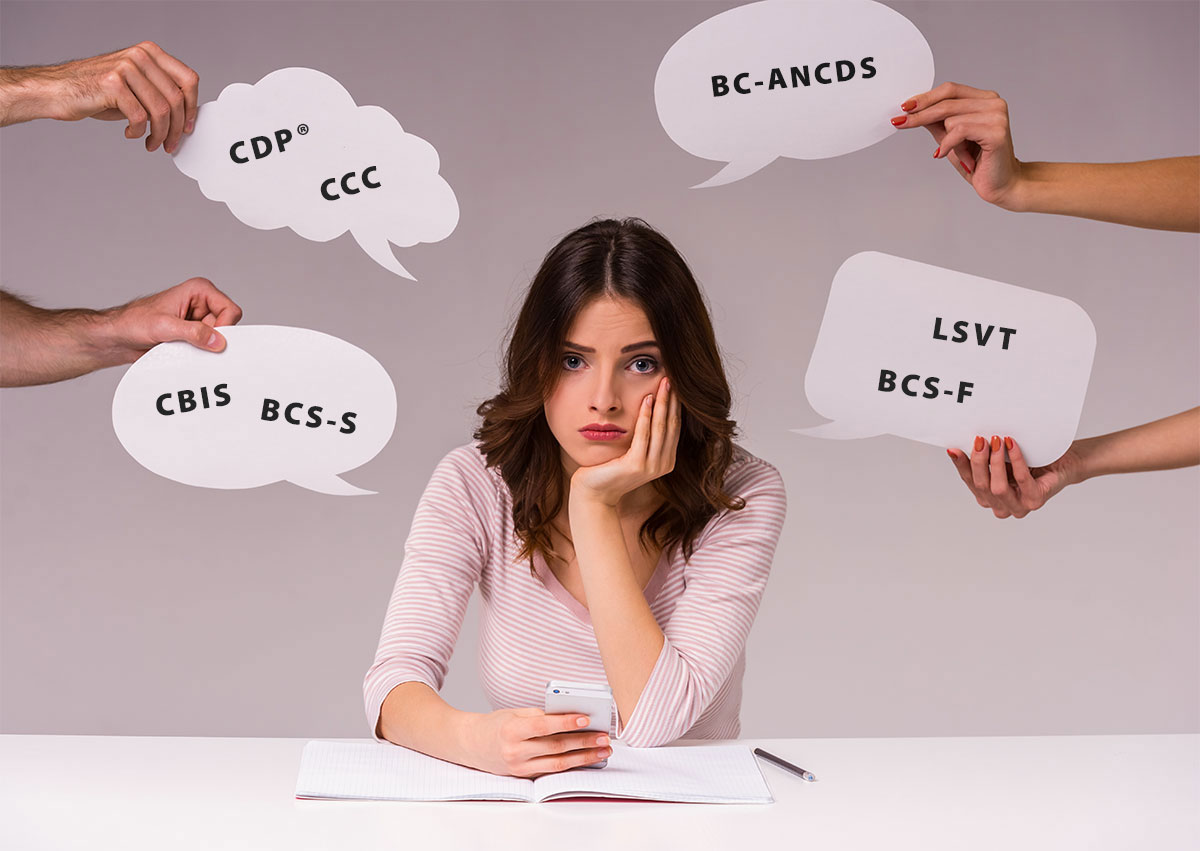
Med SLP Certification
Be a smart consumer.
The purpose of this page is to help medical speech-language pathologists (SLPs) in the United States become informed consumers of certifications in the medical SLP space. Information will be regularly added to this page in order to support this mission.
The creators of this page and all its contributors are committed to transparency and accuracy, and will continue to check for updates. To submit an edit or update, please contact medslpcertification@gmail.com with related language and verifiable links.
First, some terms… What is the difference between a certificate, certification, and license?
Licensure is required in order to practice in all U.S. states, and the intent is to protect consumers. State boards determine rules and continuing education requirements for holding and maintaining a license.
Certificates may be provided any time you complete a course or activity. There are thousands of companies in our field that provide certificates of completion of various educational activities. A certificate implies attendance and completion, not competence.
Certifications may be provided after both completing educational objectives and passing an exam for it. They are evidence of mastery, rather than evidence of education. Because of the much higher standards that a certification is meant to imply, it usually results in a designation after your name as well (e.g. CCC-SLP for U.S.-based SLPs, or CPA for accountants). In the best case scenario, the high standards and quality are ensured through independent boards and industry-wide standards for the criteria for mastery. In the worst case scenario, any business can give you some learning materials and a test, charge you for it, and label you “certified” in just about anything, without or without accreditation.
The following are all types of certifications. None of the following certifications are required in order to practice as an SLP—legally, only state licensure is mandatory, though the requirements for licensure vary by state, and some states require SLPs to earn the ASHA Certificate of Clinical Competence to qualify for licensure.
ASHA Certificate of Clinical Competence (CCC)
The most common type of certification held by SLPs in the United States is their ASHA certification – the Certificate of Clinical Competence in Speech–Language Pathology (CCC-SLP). Learn more here.
Related field certifications
Some SLPs may choose to pursue certifications in related fields if this relates to the patient populations they are working with. Examples include Board Certified Behavior Analyst (BCBA) or Certified Lactation Counselor (CLC).
ASHA specialty certifications
You may also encounter specialty certifications that demonstrate expertise in a specific clinical practice area or domain of speech–language pathology. The most common among these are ASHA’s Clinical Specialty Certifications, denoted by the letters “BCS” (Board Certified Specialist). Presently, ASHA recognizes specialty certifications for SLPs in Child Language and Language Disorders (BCS-CL), Fluency and Fluency Disorders (BCS-F), and Swallowing and Swallowing Disorders (BCS-S). More ASHA-approved specialty certifications are under development.
Other specialty certifications
There are other types of domain-specific specialty certifications as well, not just those endorsed by ASHA. One well-known example is the Board Certification awarded by the Academy of Neurologic Communication Disorders and Sciences (BC-ANCDS). You should be aware that there are countless specialty certifications available to SLPs, covering a broad range of topics. The quality and “worth” of these certifications are subjective, and can be evaluated case-by-case based on the reputation of the certification board and the qualifications necessary to earn the certification.
Certifications specific to a product or procedure
Another type of certification is a product- or procedure-specific certifications. These certifications indicate proficiency in a specific procedure, usually trademarked by a company. Common examples for pediatric SLPs include Hanen, DIR Floortime, PECS, and PROMPT. Examples in medical settings may include SOS Feeding and LSVT.
Skill-based certifications
Finally, some certifications demonstrate your proficiency with a skill. For example, MBSImP certification is similar in some ways to product-specific certifications, but has a much broader application, as it simply indicates that an SLP has reached a prescribed level of competency in modified barium swallow studies.
Read more from ASHA’s website:
Also useful:

Are med SLP certifications worth it?
This is ultimately a personal decision that depends on your areas of interest, desire for specialization and advanced training, your values, your financial situation, and your professional goals. No certification is currently mandatory to practice and be competent as a medical SLP.
No certification (other than a certificate of clinical competence in the United States) is required in order to obtain a job as a medical SLP either, or to excel as a leader in our field. The only thing that is required is licensure in the state in which you are providing services. All 50 U.S. states and the District of Columbia require a license in order to practice speech pathology professionally within the United States. Certification programs offer a chance for you to further your learning in a particular assessment or treatment modality or specialty area in our field.

There are many ways to demonstrate knowledge and leadership on your resumé.
Here are just a few…
- Listing presentations you have given, including in-services
- Listing projects and continuing education courses you have completed
- Demonstrating leadership skills, such as listing initiatives you have taken to start support groups, journal clubs, etc.
- Listing your areas of expertise supported by years of experience
- Listing your goals as a clinician (e.g., providing person-centered care, fostering interdisciplinary collaboration, etc)
- Listing ways in which you have applied research to clinical practice, such as a quality improvement or clinical training project.
- Describing a time you furthered your clinical knowledge, including how you did it and how it impacted your work or patient outcomes.
This list is not exhaustive.

How to select a med SLP certification
A certification program may be valuable to you if the information that is provided during the training is information you feel you need in order to do your job effectively and ethically. If your sole motivation for completing the certification is to obtain letters after your name, please be aware that these motivations are often exploited by companies seeking to make a profit. ASHA does not regulate companies that offer certifications, including those that promise letters after your name. Also note that many continuing education courses and programs are available that will teach you important skills (e.g., MBSS, FEES), but do not lure you in with the certification status. The certifications and certifying bodies that exist outside of ASHA are unknown to most employers and do not necessarily increase our pay or job opportunities, in most cases.

BEWARE of these red flag predatory marketing tactics…
- Promising career fulfillment
- Promising you a better job or promotion
- Promising you a higher wage
- Listing you in an exclusive database
- Hidden pricing and unverifiable claims
- Lack of transparency around who has accredited their certification
- Vague representation of experts and expertise
- Sweeping scope of certification (for example, a certification promising competence of the entire field of medical speech-language pathology as opposed to a certification promising competence in a specific therapy methodology or approach)
- Certifications and courses provided by for-profit businesses, not subject matter experts
- Courses offering certifications. Is it offered as a course but you can pay extra for a certification? This is a red flag
- Certifications offered by individuals
- Certifications offered by social media influencers
- Lack of a separate, unaffiliated third party that does not stand to gain financially that accredits the certification. Beware that companies can create LLCs and non-profits that are listed as separate names but are still owned by the same person
Some of these marketing tactics are being used for certifications, CEUs, memberships, mentoring, and several other SLP products and services.It is important we vet these courses and have open discussions, to determine their value and worth!
Certifications are NOT needed to perform the following:
- Instrumental swallow evaluations including FEES and MBS (each state has different requirements for FEES providers. ASHA does not regulate this).
- Assessment of speech, language, voice and cognition
- Aphasia and motor speech therapy
- Cognitive-linguistic therapy
- Augmentative and alternative communication
- Motor speech therapy
- Dysphagia therapy
- Voice therapy
- Trach/vent evaluation and management
- Respiratory muscle therapy (RMT)
and more…
Note that training is required for many of these and can be obtained from grad school programs, clinical rotations, supervision, mentorship, and through in-person and online continuing education courses. There are several affordable and evidence-based ways to seek out these training opportunities from experts, without needing certifications or the need to pay thousands of dollars.

Lack of regulation in the field of speech-language pathology
ASHA currently does not regulate certification programs related to the field of speech-language pathology. ASHA currently treats certifications as simply another product that can be purchased by clinicians and therefore plays no role in regulating this market. This means that anyone (SLP or not) can create a certification program with the motivation to make a profit off of med SLPs.
While it is important to provide opportunities for SLPs to advance their learning and to showcase their skillsets, it is also important that certification programs be held to a unified high ethical standard that evaluates their curriculum and marketing claims to ensure lack of conflict of interest. This is especially important if ASHA CEUs are being awarded for these certifications or if the businesses have ties with ASHA in some way. It is important that clinicians be protected from companies whose sole motivation is to sell a product and/or make a profit rather than to train clinicians, help patients, and to advance the profession.
We can look to the American Physical Therapy Association (APTA) as a strong example of a membership organization that has clearly taken the lead to establish a strong accrediting body: The American Board of Physical Therapy Specialties. Unlike membership organizations that govern other allied health professions and medical specialties, ASHA has taken on the responsibility of certifying SLPs, being our governing body, a membership organization, and CE approval body and CE provider. It is concerning that just about anyone can pay money to ASHA to become a sponsor, corporate partner, or ASHA-approved CEU provider without being vetted thoroughly, to ensure that the education and training being advertised to SLPs is truly helpful (not harmful!) and improves competency. Our question is – is the organization ethical enough to fill all of these roles or is it better if those roles are spread out to prevent conflicts of interest?
What does it mean when an ASHA approved CE Provider’s course offers a “certification?”
The credentialing community would most likely call these programs certificate programs – not a certification. (Per ASHA).
Some questions to consider before beginning a certificate program:
- Has the body of knowledge in the certificate program been validated by experts?
- Is there an assessment component to the certificate program?
- What organizations recognize the certificate?
- Will the content of the certificate program assist you in meeting clients’ needs?
- Will the content of the certificate program assist you in meeting your professional development goals?
- Remember: Although an ASHA approved CE Provider may offer a certificate program for ASHA CEUs, ASHA does not endorse any course content, specific products, certificate programs or clinical procedures.
What is the difference between a professional certification and a certificate program?
Professional certification is the voluntary process by which a non-governmental entity grants a time-limited recognition and use of a credential to an individual after verifying that he or she has met predetermined and standardized criteria. ASHA’s Certificate of Clinical Competence is a professional certification.
A certificate program is a training program on a specialized topic for which participants receive certification after completing the course and passing an assessment instrument.
Let’s be aware, ask questions, and be informed consumers of continuing education courses and certifications.
Some examples of certifications currently available to med SLPs
- For the purposes of this page and its mission, we are currently including only medical clinical certifications at this time. Please note that there are many pediatric/non-medical certifications that are also not regulated by ASHA.
- Hands-on training is defined as training that takes place in-person because it cannot otherwise be completed.
- Please note that a certification in a specific regimented program that is supported by published and peer-reviewed research and/or requires training for implementation fidelity does not belong in the same category as broad, sweeping certifications on entire topics within our scope.
- Finally, you can find out if a company or organization is non-profit by searching for them on this IRS page.
Organization or company
Ampcare, LLC
Accrediting body
None
Cost
$225
Renewal fees
Information not publicly available
Hands-on training
Yes
Letters after name
None
Required to be a med SLP
No
Organization or company
American Board of Fluency and Fluency Disorders
Accrediting body
ASHA
Cost
$250 application fee. Within the last 3 years, an applicant must have obtained 6 CEUs (60 hours) of intermediate to advanced training in fluency disorders with at least 3 CEUs (30 hours) being “live hours.”
Renewal fees
Annual dues fee of $110. Must renew every 5 years. Obtain additional 100 hours of CEUs. Must pay $250 application fee again.
Hands-on training
No
Letters after name
BCS-F
Required to be a med SLP
No
Organization or company
American Board of Swallowing and Swallowing Disorders
Accrediting body
ASHA
Cost
$100 application fee. Must obtain 75 hours of continuing education rated intermediate to advanced that relate to dysphagia within the past 3 years.
Renewal fees
Must obtain 125 hours of continuing education related to dysphagia rated intermediate to advanced over 5 years and pay another $100 application fee.
Hands-on training
No
Letters after name
BCS-S
Required to be a med SLP
No
Organization or company
Academy of Neurologic Communication Disorders and Sciences (ANCDS)
Accrediting body
Academy of Neurologic Communication Disorders and Sciences (ANCDS)
Cost
$125 for members and $210 for non-members. 60 hours of continuing education must be obtained in the three years leading up to application.
Renewal fees
$240. Must obtain 60 hours of continuing education activities every three years.
Hands-on training
No
Letters after name
BC-ANCDS
Required to be a med SLP
No
Organization or company
Brain Injury Association of America
Accrediting body
Academy of Certified Brain Injury Specialists
Cost
$300
Renewal fees
10 hours of annual continuing education directly related to brain injury in addition to $65 annual renewal
Hands-on training
No
Letters after name
CBIS
Required to be a med SLP
No
Organization or company
ASHA
Accrediting body
ASHA
Cost
$225 annually for certified members and $199 annually for certified non-members
Renewal fees
$225 annually for certified members and $199 annually for certified non-members
Hands-on training
No
Letters after name
CCC
Required to be a med SLP
Required by Alaska, Maine, Rhode Island, Virginia, and Wyoming for state licensure. Required in order to mentor CFY SLPs seeking CCC
Organization or company
National Council of Certified Dementia Practitioners
Accrediting body
National Council of Certified Dementia Practitioners
Cost
$145
Renewal fees
$145
Hands-on training
No
Letters after name
CDP®
Required to be a med SLP
No
Organization or company
Elevation Movement LLC
Accrediting body
None
Cost
$1497
Renewal fees
$50 every three years
Hands-on training
Yes
Letters after name
CMT
Required to be a med SLP
No
Organization or company
International Association of Orofacial Myology
Accrediting body
International Association of Orofacial Myology
Cost
Unlisted and unverified. SLPs report $3500+
Renewal fees
$155
Hands-on training
Yes
Letters after name
COM®
Required to be a med SLP
No
Organization or company
VitalStim®
Ciao Seminars
Accrediting body
Institute for Credentialing Excellence (ICE)
Cost
$825
Renewal fees
$350 every three years
Hands-on training
Yes
Letters after name
None
Required to be a med SLP
No
Organization or company
Lingraphica
Accrediting body
None
Cost
Free
Renewal fees
No renewal required
Hands-on training
Device demo
Letters after name
None
Required to be a med SLP
No
Organization or company
LSVT Global
Accrediting body
None
Cost
$605, $325 for students
Renewal fees
$225 to renew. Must renew every two years
$60 pricing listed when logged in
Hands-on training
No
Letters after name
Can use the LSVT trademark to indicate they are LSVT-trained clinician
Required to be a med SLP
No
Organization or company
Theresa Richard, MedSLP Ed
Accrediting body
None
Cost
$8,000. Price to rise after first cohort
Renewal fees
Information not publicly available
Hands-on training
No
Letters after name
MSLP
Required to be a med SLP
No
Organization or company
Montreal Cognitive Assessment
Accrediting body
None
Cost
$150
Renewal fees
Renewal information not available on website
Hands-on training
No
Letters after name
None
Required to be a med SLP
Only required if your facility/employer requires that you administer the MoCA
Organization or company
Florida Dysphagia Institute / ProCourse
Accrediting body
None
Cost
$600
Renewal fees
Recommend retaking the course after 3 years. $225 communicated via their email newsletter
Hands-on training
No
Letters after name
None
Required to be a med SLP
No
Organization or company
Northern Speech Services
Accrediting body
None
Cost
$600
Renewal fees
$99. Must renew every 5 years
Hands-on training
No
Letters after name
None
Required to be a med SLP
No
Organization or company
Neonatal Therapy Certification Board
Accrediting body
Self-accredited
Cost
Application Fee: $250
Examination Fee: $400
Renewal fees
No certification or renewal fees
Hands-on training
No
Letters after name
None
Required to be a med SLP
No
Organization or company
Neonatal Therapy Certification Board
Accrediting body
Self-accredited
Cost
Application Fee: $250
Examination Fee: $400
Renewal fees
No certification or renewal fees
Hands-on training
No
Letters after name
CNT
Required to be a med SLP
No
Organization or company
SOS Approach to Feeding
Accrediting body
None
Cost
$1250
Renewal fees
Information not publicly available
Hands-on training
No
Letters after name
None
Required to be a med SLP
No
Organization or company
Parkinson Voice Project
Accrediting body
None
Cost
$475
Renewal fees
No certification or renewal fees
Hands-on training
No
Letters after name
None
Required to be a med SLP
No
Organization or company
VitalStim®
Ciao Seminars
Accrediting body
Institute for Credentialing Excellence (ICE)
Cost
$825
Renewal fees
$350 every three years
Hands-on training
Yes
Letters after name
None
Required to be a med SLP
No
We hope that this page will help students and clinicians make informed decisions about their continuing education and be more aware about certifications offered for medical SLPs. We also hope it will encourage businesses to be more transparent about their training, their pricing, and in their marketing. The creators of this page are committed to transparency and accuracy, and will continue to check for updates over time. To submit an edit, update or any feedback, please contact medslpcertification@gmail.com.
Med SLP Certification
This information is provided by:
Sarah Baar, MA, CCC-SLP
Meredith Poore Harold, PhD, CCC-SLP
Brooke Richardson, MS, CCC-SLP
Rinki Varindani Desai, MS, CCC-SLP
Reed Senter, PhD, CCC-SLP